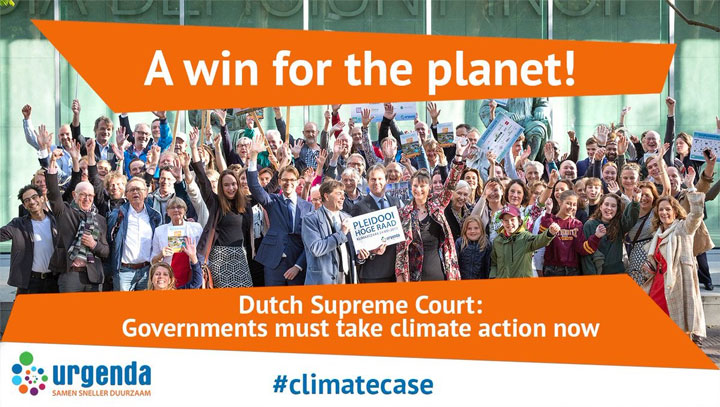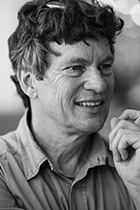2020: The year of civil disobedience in order to decentre humans (also in African Studies)?


Harry Wels is an organizational anthropologist by training. His research is about organizational structures of cooperation in the context of nature conservation and relates to broader issues in animal studies. He has written this blog as the convenor of the Collaborative Research Group Trans-species perspectives on African Studies.
Last year I wrote a New Year’s blog in which I wondered if 2019 could become the year of ‘the decentring of the human in African Studies’. If the, according to many, failed UN climate conference in Madrid in December 2019 can be seen as some sort of answer to this question, not so much focusing on Africa but answering the question globally, we can conclude that humans still feel to be standing very firm on their pedestal of superiority.
No matter Greta (Thunberg), further scientific underpinnings, reports from trustworthy institutions, weird weather conditions all around the globe, and what not, we still seem to persist in our human superiority complex. So what to do next? If nothing has been able to turn the tide in 2019, should that lead us into passiveness for 2020, or do we persevere trying, no matter what? I would like to argue for the latter, yet following in the spirit of the title of a column of Tommy Wieringa in one of our Dutch national newspapers, NRC Handelsblad, it is ‘Optimism without hope’. Let me give two examples of what this perseverance and ‘optimism without hope’ could look like, one from a Dutch law suit and one coming from the global scientific community and why they give rise to optimism, although not necessarily hope.
The Urgenda case
In 2012 the Dutch foundation for innovation and sustainability Urgenda sued the Dutch state for not protecting its citizens enough against climate change and not living up to its promises to do so. The Dutch government promised its citizens that it would reduce its CO2 emissions with 25% before 2020 compared to the level of emissions in 1990. It has become clear that they have not succeeded in living up to that promise. In 2015 the court decided that Urgenda was right. The Dutch government appealed to that judgement. In 2018 this judgement was reiterated in a higher level court… and again the Dutch government appealed to the judgement. Now, on 20 December 2019, the judgement was upheld again in this final round of appeal, in the High Court, victory for Urgenda!
Act incredibly fast
The Dutch government must now act incredibly fast to do its utmost to live up to this High Court judgement. At the same time it can already be predicted that it is an almost perfect case of ‘optimism without hope’. ‘Optimism’, because the case is won and is used as a judicial precedent and example around the globe. ‘Without hope’ as everybody can already feel it coming that the Dutch government will never be able to live up to its earlier promises at such short notice. But if citizens start to call their governments to account, which up till now has been very unconventional, it may be a way forward in the hope that more is to follow. In that line of thinking….
A call to ‘mass civil disobedience’ by scientists
In October 2019 and in the very spirit of the Urgenda case, 395 scientists from around the globe endorsed a call towards mass civil disobedience in order to force governments to take action and ‘tackle’ climate change. Failure to do so, and legitimising the call according to the scientists, would lead to ”incalculable human suffering”. Reading the declaration, Emily Grossman, a science broadcaster with a PhD in molecular biology, said: “We believe that the continued governmental inaction over the climate and ecological crisis now justifies peaceful and non-violent protest and direct action, even if this goes beyond the bounds of the current law”. This call to action is in sync with the repeated warnings of some 11.000 scientists about what is happening to this planet, and who have declared that the changes in our climate worldwide are now to be labelled as an ‘emergency’. Optimism again about so much action, but again: we don’t know if it should lead to any hope, given ‘Madrid’.
A way forward: ‘Optimism without hope’
Could it be that these two examples could lead to accelerating the process of decentring the human to its rightful place amongst other more-than-human life forms making up this planet of ours, as scientific evidence nowadays is making abundantly clear, instead of considering ourselves at a culturally imagined apex?[1] Because the reverse could also be argued for: The Urgenda movement and the protesting scientists might be more worried about further human existence on this planet than anything else, keeping our species, maybe if even unintended, at the centre of attention. But here I want to argue with ‘optimism without hope’ that the only way forward to live up to the Urgenda judgement and to the levelling of the playing field between human and other life forms, leads inevitably to a decentring of the human species… even in African Studies.
[1] This short blog is not the place to elaborate on the many scientific angles from which it is shown that the playing field between humans and other life forms is much more levelled than we thought; that we differ from other life forms just in degree and not in kind. One example of the levelled playing field between humans and animals: Bekoff, M. and Pierce, J. (2017) The animals’ agenda. Freedom, compassion, and coexistence in the human age, Boston: Beacon Press; one example of the levelled playing field between humans and plants: Mancuso, S. and Viola, A. (2015) Brilliant green. The surprising history and science of plant intelligence, Washington: Island Press
This post has been written for the ASCL Africanist Blog. Would you like to stay updated on new blog posts? Subscribe here! Would you like to comment? Please do! The ASCL reserves the right to edit, shorten or reject submitted comments.
Photo credits
Top photo: Urgenda


Add new comment